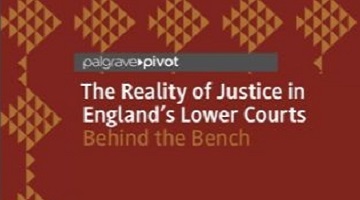Why study this course with LJMU?
- 90% of students surveyed said academic support on this course was good or very good (National Student Survey 2024)
- This is an accredited undergraduate psychology programme giving you eligibility for membership of the British Psychological Society on graduation
- Brings together the established disciplines of Criminology and Psychology for a unique perspective on individuals, society and the criminal justice system
- Recent increase in demand for criminal psychologists in prison programmes and offender management
- Contemporary research informed teaching in cutting-edge subjects such as terrorism and forensic psychology
- Established links with employers and agencies allow for excellent networking, volunteering and work experience opportunities
- Opportunity to undertake international fieldwork visits to places such as Ljubljana, Slovenia and Gothenburg, Sweden
About your course
The professionally accredited BSc (Hons) Criminology and Psychology at Liverpool John Moores University is informed by ongoing research and extensive links with practitioners. So you can be confident that your studies will be at the forefront of developments in this fascinating field.
The public and political controversies surrounding crime and criminal justice processes in the UK form an important and ongoing context for study.
This degree will take you on a critical exploration in the field of Criminology and Psychology meaning you will benefit from cutting-edge theory and practice from both disciplines.
Psychology is more concerned with developing a quantitative and qualitative understanding of the individual and what makes them tick, whereas criminologists examine society's responses to crime and justice in the context of everyday life.
This means you will graduate with an understanding of how crime occurs, who commits it, how it is measured and how criminal justice impacts on the lives of different social groups.
Course modules
What you will study on this degree
Further guidance on modules
Modules are designated core or optional in accordance with professional body requirements, as applicable, and LJMU’s Academic Framework Regulations. Whilst you are required to study core modules, optional modules provide you with an element of choice. Their availability may vary and will be subject to meeting minimum student numbers.
Where changes to modules are necessary these will be communicated as appropriate.
Core modules
An Introduction to Criminological Theory
20 credits
20 credits
This module will introduce you to a core of key theoretical perspectives within criminology. You will be encouraged to reflect upon the ways in which different theoretical strands have attempted to explain crime and criminal behaviour. This will foster an understanding of the reasons for these differences and similarities between different theoretical approaches.
Inside the Criminal Justice System
20 credits
20 credits
This module will introduce you to the roles, agencies and institutions key to the operation of the Criminal Justice System. You will outline the decision-making mechanisms and how the Criminal Justice System operates in practice. Alongside this, you will also consider the range of possible outcomes arising from involvement with the Criminal Justice System and the impacts of this for individuals, groups and communities.
Research Methods and Statistics in Psychology 1: Relationships and Associations
10 credits
10 credits
This module will introduce the tools needed for carrying out a literature search. It will provide you with a practical introduction on how to design an experiment, collect data in an ethical manner, perform statistical analysis and write up findings in a manner consistent with published material.
Introduction to Developmental Psychology and Individual Differences
20 credits
20 credits
The aim of this module is to present a range of topics in developmental psychology and individual differences research. You will be introduced to methods applied to understanding key issues in developmental psychology and individual differences research to enable you to consult and summarise appropriate sources to explain key issues.
Research Methods and Statistics in Psychology 2: Testing for Differences
10 credits
10 credits
This module will introduce the tools needed for carrying out a literature search. It will provide you with a practical introduction on how to design an experiment, collect data in an ethical manner, perform statistical analysis and write up findings in a manner consistent with published material. Building on from Research Methods and Statistics in Psychology 1: Relationships and Associations, you will learn more complex statistical tests.
Criminology and Psychology Into Action
20 credits
20 credits
This module will allow you to appreciate the requirements of studying at HE level within the context of the Criminology & Psychology programme and to acquire such skills in a supportive environment and module structure.
You will be provided an induction to ensure you can make use of the Library, JMU intranet, Canvas and other key aspects of studying at LJMU. We hope this will encourage you to engage with the development of your employability skills.
Introduction to Biological and Cognitive Psychology
20 credits
20 credits
This module introduces you to biological and cognitive psychology. You will examine fundamental issues in cognitive psychology and will consider theoretical models of memory, as well as examining attention and perception. You will introduced to fundamental issues in biological psychology.
Core modules
Key Thinkers for Criminology
20 credits
20 credits
This module will help you to critically evaluate the theoretical perspectives of a number of key thinkers in criminology. A review of existing literature will enable you to appreciate the intellectual histories of their work. In doing so, you will be able to evaluate the strengths and weaknesses of these theorists’ work for explaining crime and our responses to it.
Research Methods and Statistics in Psychology 4: Advanced Quantitative Research Methods
20 credits
20 credits
This module enables you to examine the use of advanced tests of differences and relationships in psychological research. You will develop an understanding of factorial analysis of variance (ANOVA), multivariate analysis of variance (MANOVA), simple regression and multiple regression.
Cognitive and Biological Psychology
20 credits
20 credits
This module covers key topics in the area of cognitive and biological psychology. This module builds on the biological and cognitive psychology materials introduced in level 4. You will explore current research relating to biological underpinnings that account for commonalities and individual differences in vision, touch, sleep, motivation, learning and consciousness.
Developmental Psychology, Social Psychology, and Individual Differences
20 credits
20 credits
In this module you will explore psychological development through the life span, covering key areas of development such as cognitive development, identity development and developmental disorders. The module will cover key concepts from individual differences research: intelligence, gender commonalities and differences, and personality and subjective wellbeing. You will also gain an understanding of social psychological concepts such as interpersonal relationships, group processes and intergroup relations.
Qualitative Research Methods
20 credits
20 credits
This module will provide an introduction to a range of qualitative research methods. With the intention to foster your ability to undertake an ethically and procedurally sound research project. During this time, you will have the opportunity to improve your ability to work and communicate in a team. Completion of this module will empower you to design, collect, analyse and present qualitative data and findings carefully and with due regard for ethical procedures.
Optional Modules
Study Year Abroad - Criminology
120 credits
120 credits
The aim is to provide students with an additional year of study at an approved overseas partner that will complement their programme at LJMU. This is an additional year of full-time study at an approved higher education institution. The modules to be studied must be agreed in advance, and must be appropriate for the student's programme of study. Assuming successful completion of this year, mark-bearing credit will be awarded by the Faculty Recognition Group. The grade conversion scale to be used will be made available in advance of the year abroad.
Criminology into Practice
20 credits
20 credits
This module will help you to understand some of the connections between criminology and practice. It centres on talks from invited guest speakers to provide an insight into a range of contemporary issues in practice. As a result, you will be able to contextualise issues facing practitioners and employers in a range of fields relevant to criminology.
The module will also support your ability to reflect on your employability skills and access relevant employability resources and support.
Crimes and Harms of the Powerful
20 credits
20 credits
This module intends to critically engage you with important questions around harm, responsibility, accountability and regulation. It seeks to explore how and why particular acts (or failures to act) by particular actors become viewed as ‘crimes’ worthy of criminal justice sanction, whilst others do not.
The module aims to apply the core concepts of harm, responsibility, accountability and regulation to the study of powerful people, groups and institutions. In doing so, it hopes to enhance your knowledge and understanding of social harm theory, the harms caused by state and state-corporate acts and omissions, the competing claims made around organisational and individual agency, and the problems and possibilities of different regulatory approaches.
Social Divisions and Social Justice
20 credits
20 credits
During this module, you will explore criminological theory which examines criminalisation, management and punishment of social divisions. You will use case studies to illustrate the management of social divisions across the policy terrains of penology and social policy. Alongside this, you will explore the impacts of criminalisation and punishment on different social divisions and how social justice might be achieved.
Contemporary Perspectives in Criminology
20 credits
20 credits
This module will help you to understand the complexities of contemporary theoretical perspectives in criminology, moving beyond standard ‘textbook’ accounts of crime, deviance and/or social control. Using this knowledge you will be able to evaluate the relative strengths and weaknesses of contemporary accounts of crime and deviance in relation to their more established counterparts.
Core modules
Psychology Dissertation
40 credits
40 credits
This module aims to allow you to develop and independently apply your empirical research skills in your chosen area of psychology. You will explore in depth, recent and relevant literature in your chosen field and use it to guide the design of a methodologically appropriate study to address a specific research question.
Optional Modules
Forensic and Investigative Psychology
20 credits
20 credits
This module aims to allow you to critically evaluate and apply psychological theories and knowledge in relation to real-world forensic problems. You will work in cross-disciplinary groups to critically explore and evaluate a range of potential solutions to real-world problems.
Health Psychology
20 credits
20 credits
This module will explore psychological theory, as it relates to public health care. It will also examine some of the major threats to public health, including obesity, diabetes and cardiovascular disease. You will explore in-depth the major concepts and research methods used in the field of health psychology.
Cognitive Neuroscience
20 credits
20 credits
Cognitive Neuroscience addresses the question how the brain enables human cognition and behaviour by employing a variety of different methodologies. The module will examine how methodologies as for example lesion studies, functional brain imaging, electrophysiological studies and behavioural experiments contribute to our understanding of a variety of cognitive functions such as memory, attention and perception.
Green Criminology – Crimes and Harms to the Global Environment
20 credits
20 credits
This module will explore how 'green' or environmental' crime is conceptualised and addressed within Criminology, and related disciplines. You will examine how 'green' or 'environmental' crimes are perpetrated and the harms it generates for victims and society. In doing so, you will be able to assess the relative success and failure of regulatory and criminal justice frameworks in addressing 'green' or 'environmental' crime and associated harms.
Positive Psychology
20 credits
20 credits
The aim of this module is to explore in-depth the major concepts and research methods used in the field of positive psychology. You learn in-depth discussions of the psychology science associated with human strengths, flourishing and positive emotions. You will also explore the position of Positive Psychology in relation to other branches of Psychology.
Psychology in Education
20 credits
20 credits
This module will be of interest if you are considering a career in teaching or Educational Psychology. Factors affecting individual differences in children's academic performance will be explored with a particular emphasis on cognitive factors. In considering educational interventions you will learn about the ethics of research into interventions. You will think critically about the selection of interventions for specific learning difficulties based on research evidence and develop psychological literacy that would be relevant for a career in education.
International Fieldwork in Criminology
20 credits
20 credits
This module will provide you the opportunity to conduct a focused piece of critical independent work in an international context, under supervision, on an area congruent with the themes and substance of Criminology. The module will act as a vehicle for the improvement and development of a variety of transferable skills and abilities appropriate to the task in hand, from identification of appropriate topic/s through to the development of a viable study programme, and the presentation of a clear, coherent and robust piece of reflective written work. By participating in this module, you'll be encouraged to monitor and reflect critically on your own learning.
Psychopharmacology and Addictive Behaviour
10 credits
10 credits
This module will introduce you to popular drugs of abuse, their mechanisms of action and their effects. You will learn how the effects of drugs can be harmful and are related to many factors including purity, dose and route of administration.
Police, Power and Social Order
20 credits
20 credits
This module will encourage you to critically consider the exercise of police power and its relationship to ideas of social and political order and disorder. You will explore the origins of police, considering the development, expansion and transformation of policing in domestic, colonial and international settings. In doing so, you will foster a critical understanding of the policing of a range of marginalized, minority and dissenting/dissident populations.
Face Perception: Processes and Disorders
10 credits
10 credits
The aim of this module is to introduce you to theory and research relating to the processes of attending to, categorising and recognising human faces. You will also be able to examine the forensic applications of research in face perception.
Social Cognition
10 credits
10 credits
The aim of this module is to introduce you to theory and research concerning social cognition and to analyse and evaluate key models and theories within the field of social cognition. You will also be able to explore contemporary applied issues in social cognition.
Children and Young People 'at Risk'
20 credits
20 credits
This module will critically explore the contemporary principles and perspectives surrounding children and young people 'at risk' in various contexts. You will assess how these principles and perspectives inform legal, policy and practice responses to children and young people 'at risk'. This understanding will help you to interrogate the debates that surround contemporary responses to children and young people 'at risk'.
Work Psychology
10 credits
10 credits
The module is designed to provide a clear introduction to work psychology by covering contemporary research material to enable students to develop a critical understanding of some of the key themes in work psychology.
Power, Politics, and Human Rights
20 credits
20 credits
This module was developed to provide a summative overview of the theoretical and philosophical underpinnings of Human Rights. Participation in this module will enable you to examine the ideas, theories, and politics of global human rights, as well as evaluating the discrepancy between the theory and practice of human rights.
Psychology of Sexual Violence
10 credits
10 credits
This module aims to provide criminal justice practitioners of the future a basic understanding of sexual violence and sexual offenders, providing you with an understanding of the different types of sexual violence and an understanding of the psychological theories and motivational explanations which underpin our current understanding of why offenders commit such offences.
Child and Youth Justice
20 credits
20 credits
This module will explore how the emergence and development of the youth justice system has served to recognise the special case of the child in conflict with the law. You will examine how criminology has sought to conceptualise and address the Youth Justice System and its impacts on children's and young people's lives and life chances. This will enable you to evaluate the Youth Justice System's attempts to address the deviant, criminal and violent behaviours of children and young people.
Security, Terrorism, and War
20 credits
20 credits
This module examines the challenges associated with defining and studying terrorism and insurgency. As a criminology student, you will assess how terrorism is constructed in social, political, legal, and media discourses. You will analyse how governments and nation-states respond and react to contemporary forms of terrorism in a globalised world, mapping the connections between organised crime and terrorist actors. Alongside this, you will also document the effects of counterterrorism and security policy on communities and counter-hegemonic politics.
Understanding and Challenging Inequalities and Stigma
20 credits
20 credits
This module will critically analyse theoretical explanations of inequalities, and stigma. As a criminology student, you will be expected to utilise a range of contemporary case studies to explore the experiences of stigmatised groups and as a means of developing your ability to critically apply criminological and sociological theoretical perspectives. Alongside this, you will explore the opportunities and barriers to addressing inequality and stigma, situating discussion within historical, social and political contexts.
Professional accreditation/links
This course is recognised by the British Psychological Society (BPS), which means that you will be eligible to join the Society on graduation. Membership of the BPS is recognition of your professional status and reflects your aspiration to represent the highest possible professional standards, so it will make a valuable addition to your CV and enable access to a range of postgraduate options.
Your Learning Experience
Excellent facilities and learning resources
We adopt an active blended learning approach, meaning you will experience a combination of face-to-face and online learning during your time at LJMU. This enables you to experience a rich and diverse learning experience and engage fully with your studies. Our approach ensures that you can easily access support from your personal tutor, either by meeting them on-campus or via a video call to suit your needs.
Teaching is delivered via a combination of lectures, workshops, seminars, online activities and one-to-one consultations with your tutors. You will also be expected to study independently and conduct your own self-directed research.
You will have access to our extensive collection of books and journals, many of which are available electronically in order to allow independent learning at a convenient time and place. These collections are regularly updated by academic staff, supported by our subject specialist librarians. Our libraries also contain spaces for group and individual study for those who prefer to learn 'on campus'. We also have access to a wealth of relevant databases, which you will be taught how to use as part of your degree programme. These resources allow students to carry out their own research, for example by helping locate relevant official publications or newspaper articles. We also use them as part of lectures and workshops.
Work-related Learning
Alongside your academic studies, you will gain range of transferable skills in analysis and interpretation, presentation, teamwork, initiative and research.
For example, the Dissertation module requires you to:
- identify an appropriate topic
- develop a programme of study
- present a clear, coherent and robust piece of written work
While the International Fieldwork module provides students with a unique opportunity to develop and improve these transferable skills within an international context.
Dedicated personal tutor, plus study skills support
It is often useful to discuss course-related issues on a one-to-one basis and for this reason we will assign you a personal tutor for the duration of your studies at LJMU. Your tutor will also help you put together your personal development plan so that you can monitor progress and set your own targets. Module tutors will provide support in the form of online learning materials, course guides and one-to-one consultations if you need them, and there will be study skills sessions to help you prepare for assessments.
Assessment varies depending on the modules you choose, but will usually include a combination of exams and coursework.
We understand that all students have different strengths and preferences when it comes to assessments, so we use a variety of methods to assess your work, including essays, exams, fieldwork projects, reports, case studies, portfolios, online blogs and wikis, work-place practice, posters, presentations (individual and group), debates, reviews and group work. You will normally receive extensive written feedback on your assessments and regular verbal feedback.
All feedback is designed to help you achieve your full potential and get the most out of your studies, so staff will be available to discuss it with you and direct you to further support if you feel you need it.
Your marks and feedback will be available within 15 working days of submitting a piece of work. That's because we believe that constructive feedback is vital in helping you identify your strengths as well as the areas where you may need to develop further.
Where you will study
What you can expect from your School
Based within the John Foster Building, in the Mount Pleasant Campus, the School of Justice Studies is a leading provider of education in Policing Studies, Criminology and Criminal Justice. We provide specific training for policing students wishing to enter the service as a graduate recruit. The John Foster Building has many outstanding facilities, including well-equipped IT Suites, a light-filled Student Common Room and dedicated study areas. At the back of the John Foster Building is the Aldham Robarts Library, where you can access an exceptional range of materials to support your studies.
Course tutors

Dr Stephen Wakeman
- Programme leader
We ensure teaching is informed by contemporary research, while maintaining excellent links with employers and agencies which can lead to good opportunities for student work placements
We ensure teaching is informed by contemporary research, while maintaining excellent links with employers and agencies which can lead to good opportunities for student work placements
Steve joined LJMU as a lecturer in criminology in August 2014 after completing his PhD in the Centre for Criminology and Criminal Justice at the University of Manchester. His PhD was an ethnographic study of heroin and crack cocaine users and dealers in the North-West of England. Prior to this he worked in drug rehabilitation centres, homeless hostels, and at a ‘problem’ youth project. Steve has knowledge and expertise in three main areas: drugs (specifically addictions, policy, and heroin and/or crack cocaine use/markets); media (specifically cultural representations of crime and deviance in popular and/or 'new' media); and criminological theory (specifically cultural, visual, critical criminologies, or any other progressive theory, as well as the use of autoethnographic methods in criminology). His work has been published in a number of leading criminology journals, and he is currently the reviews editor of the British Journal of Criminology. He is writing a book on autoethnographic criminology to be published by Routledge in 2021, and another with Tammy Ayres and Stuart Taylor about drugs and crime to be published by Sage in 2022. Steve would be happy to discuss potential PhD supervision with students in any area related to drugs, media or theory, but especially if the project has an autoethnographic element to it. Steve also has a very nice collection of retro adidas trainers, plays golf (poorly) and guitar (very, very poorly), and keeps a Boston terrier named Lennon that sometimes bites him.
-

-
 Reader
Reader -

-
 Reader
Reader -
 Principal Lecturer
Principal Lecturer -
 Lecturer/Senior Lecturer
Lecturer/Senior Lecturer -
 Lecturer/Senior Lecturer
Lecturer/Senior Lecturer -
 Lecturer/Senior Lecturer
Lecturer/Senior Lecturer -
 Lecturer/Senior Lecturer
Lecturer/Senior Lecturer -
 Lecturer/Senior Lecturer
Lecturer/Senior Lecturer -

-
 Lecturer/Senior Lecturer
Lecturer/Senior Lecturer -
 Lecturer/Senior Lecturer
Lecturer/Senior Lecturer


Both sides of the degree complement each other greatly, adding that bit extra to your Honours degree.
Career paths
This BSc degree in Criminology and Psychology opens up a varied and exciting range of career opportunities.
The range of careers open to you once you graduate include:
- probation work
- youth justice
- drug referral schemes
- victim support
- police and prison services
- legal professions
- local government
- social work
- postgraduate study and research
Some graduates have even used their degree to secure a career in the media research, teaching and charity work. It is likely that you will encounter some of our graduates as guest lecturers during your own studies.
Student Futures - Careers, Employability and Enterprise Service
A wide range of opportunities and support is available to you, within and beyond your course, to ensure our students experience a transformation in their career trajectory. Every undergraduate curriculum includes Future Focus during Level 4, an e-learning resource and workshop designed to help you to develop your talents, passion and purpose.
Every student has access to Careers Zone 24/7, LJMU's suite of online Apps, resources and jobs board via the LJMU Student Futures website.
Tuition fees and funding
- Home full-time per year:
- £9,535
The University reserves the right to increase tuition fees in accordance with any changes to the maximum allowable fees set by the UK Parliament. In the event of such a change, any fee increase will be subject to a maximum cap of 10% of the total course cost as originally stated at the time of your offer.
The fees quoted above cover registration, tuition, supervision, assessment and examinations as well as:
- library membership with access to printed, multimedia and digital resources
- access to programme-appropriate software
- library and student IT support
- free on-campus wifi via eduroam
Additional costs
Although not all of the following are compulsory/relevant, you should keep in mind the costs of:
- accommodation and living expenditure
- books (should you wish to have your own copies)
- printing, photocopying and stationery
- PC/laptop (should you prefer to purchase your own for independent study and online learning activities)
- mobile phone/tablet (to access online services)
- field trips (travel and activity costs)
- placements (travel expenses and living costs)
- student visas (international students only)
- study abroad opportunities (travel costs, accommodation, visas and immunisations)
- academic conferences (travel costs)
- professional-body membership
- graduation (gown hire etc)
Funding
There are many ways to fund study for home and international students. From loans to International Scholarships and subject-specific funding, you'll find all of the information you need on our specialist funding pages.
- International full-time per year:
- £17,750
International Scholarships and payment plans
Liverpool John Moores University is committed to supporting international students by providing a range of scholarships and flexible payment plans to help students manage their tuition fees.
Scholarships
LJMU provides a variety of scholarships to support international students. Scholarships are available to self-funded students who have accepted their offer and met all the conditions outlined in their offer letter. Students must also demonstrate that they can cover living costs, travel, and other expenses associated to studying at the university. Postgraduate scholarships include tuition fee reductions and are often offered in partnership with external funding organisations.
All self-funded international students are eligible for an automatic scholarship worth up to £4,000. For more details and to view our full list of scholarships, visit the international scholarship webpages.
Deposit
All students must pay a £5,000 deposit before they can receive their CAS letter.
For more information view our deposit page.
Tuition Fee Payment Plan
After paying their £5,000 deposit, students have the option to pay their fees in full or in three equal instalments minus any internal scholarships and discounts. There are two payment options available for international students. You can either pay your tuition fees in full before enrolment or opt for a payment plan. With the payment plan, you can pay your fees in three instalments after making your £5,000 deposit. The first instalment is due before enrolment.
All payments should be made through Flywire. Full details can be found in the How to Pay Guide.
Early Bird Tuition Fee discount
We are excited to introduce a £500 Early Payment Discount to all self-funded international students. Eligible self-funded students who pay their fees by the required deadlines will get a discount which will be automatically deducted from the 1st year of tuition fees.
To see the required deadlines please visit the webpage
Entry requirements
Please choose your qualifications below to view requirements
Grades/points required from qualifications: BBC-ABB (112-128)
Work out how many UCAS points your qualifications are worth by visiting the UCAS Tariff Calculator.
Qualification requirements
GCSEs and equivalents
A levels
BTECs
Extended Diploma: DMM-DDM
Access awards
International Baccalaureate
Acceptable on its own and combined with other qualifications
OCR Cambridge Technical
Extended Diploma: DMM-DDM
Irish awards
Acceptable on its own and combined with other qualifications
T levels
Further information
-
DBS, Occupational Health requirements
Can this course be deferred?
Yes
International requirements
IELTS
Please Note: All international qualifications are subject to a qualification equivalency check.
How to apply
Securing your place at LJMU
UCAS is the official application route for our full-time undergraduate courses. Further information on the UCAS application process can be found here https://www.ljmu.ac.uk/study/undergraduate-students/how-to-apply.
The following criteria are desirable but not essential. We will use them to rank applications.
Please demonstrate your development of these attributes in the personal statement included in your application:
- Good written and verbal communication skills, as you will be expected to convey knowledge to other people
- Good analytical skills, so that you can evaluate policies and practice
- Good reading and information retrieval skills - obtaining information from a range of sources and using it to support analysis
- An interest in social life and the issues and challenges it presents
Your university life
From accommodation and academic support to clubs and societies. Find out what LJMU has to offer.
Related Links
Talk to our students
Connect with a current LJMU student for advice and guidance on university life, courses and more.
See what our students are saying
At LJMU we want you to know you're making the right choice by studying with us. You can see what our students are saying about their experience with us through their reviews on the following websites:
Related Links
News and views
Browse through the latest news and stories from the university



.png)






The university reserves the right to withdraw or make alterations to a course and facilities if necessary; this may be because such changes are deemed to be beneficial to students, are minor in nature and unlikely to impact negatively upon students or become necessary due to circumstances beyond the control of the university. Where this does happen, the university operates a policy of consultation, advice and support to all enrolled students affected by the proposed change to their course or module.
Further information on the terms and conditions of any offer made, our admissions policy and the complaints and appeals process.
















